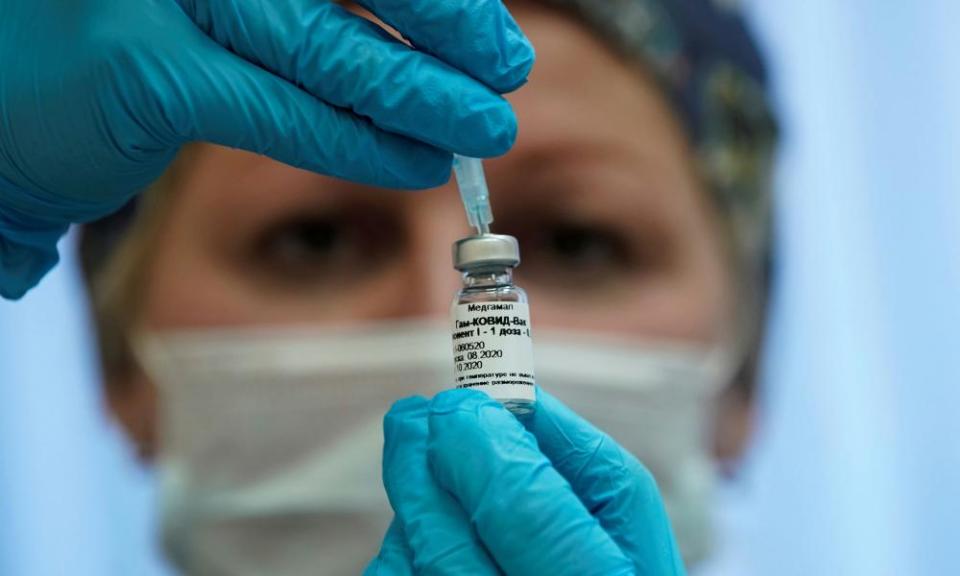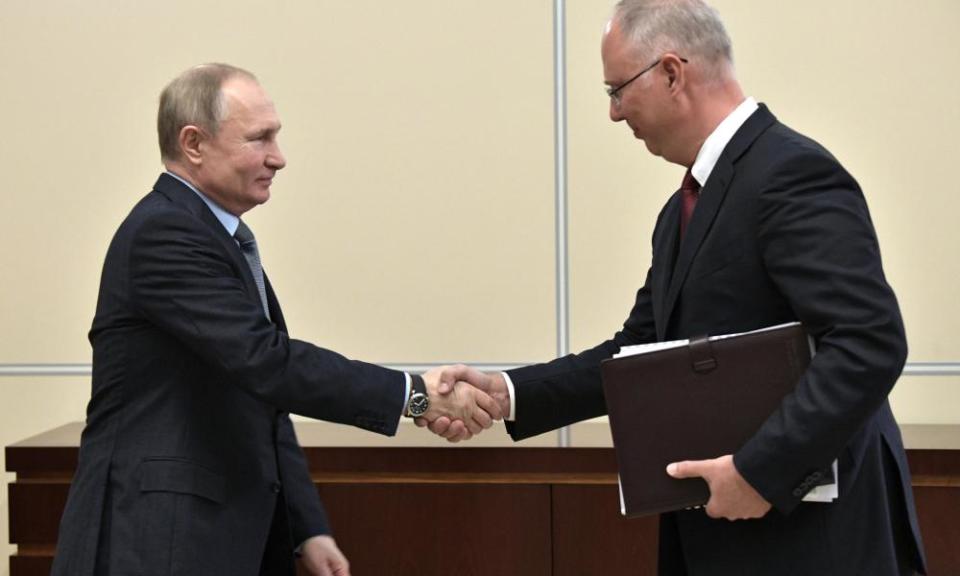'Only time will tell': Russia places huge bet on Covid vaccine

For Kirill Dmitriev, the man in charge of selling Russia’s coronavirus vaccine to the world, there’s a simple rationale behind Moscow’s accelerated push to be the first country to roll out a coronavirus vaccine for widespread use.
“It’s part of the Russian mentality to save the world,” said Dmitriev, head of Russia’s RDIF sovereign wealth fund, in an interview with the Guardian.
Others see things rather differently. After the president, Vladimir Putin, announced on 11 August that the Russian vaccine had “passed all necessary tests”, there was a chorus of unease from scientists around the world. Many pointed out that no scientific data had been made public from early trials, and phase three trials of the vaccine had not even started.

There were also earlier allegations from British security officials that Russian hackers had stolen secrets from medical institutions in the west. Dmitriev dismissed the criticism and allegations as a “concerted effort to tarnish the Russian vaccine for political reasons”.
What is clear is that the vaccine race has become another front in the standoff between Russia and the west. It is no accident that Russia has named its vaccine Sputnik V, harking back to the Soviet satellite sent into orbit in 1957 amid fierce competition with the US. For Russia, providing the first solution to a pandemic that has affected every corner of the world would be seen as a confirmation that the country’s scientific brains are still among the world’s best.
“It’s like the space race half a century later. If indeed it’s a success story and Russia is the first country to come up with an efficient vaccine then of course it’s a major PR opportunity,” said Andrey Kortunov, who runs the Russian International Affairs Council in Moscow.
But first, Russia has to prove that Sputnik V, produced by the Gamaleya, part of the country’s ministry of health, actually works. In early September, Gamaleya scientists published the results of phase one and two trials in the Lancet, and a phase three trial is now under way, which should involve 40,000 volunteers being vaccinated in the coming weeks. Even at this early stage, however, the government is pushing ahead with ambitious plans for a broad rollout across the country and beyond.
While there is clearly one eye on global glory, producing a successful vaccine will also be welcome at home, given Russia has recorded the fourth-highest number of Covid cases in the world. A second wave is well under way, with the number of new cases rising dramatically in recent days. On Monday, Putin appealed to Russians to take “maximum responsibility” for their behaviour and try to minimise the Covid risks.
Related: 'They've jumped the gun': scientists worry about Russia's Covid-19 vaccine
“We are already vaccinating high-risk groups in different regions of Russia, and we will go to about 10m doses a month in December,” said Dmitriev, estimating that within seven to nine months, the majority of Russians will have been vaccinated. While the doses for Russians will be produced inside the country, Russia hopes to license production to a number of other countries, including India, and Dmitriev estimated that capacity could be 500m doses a year by next year.
These numbers may be wildly unrealistic, but the confidence with which they are stated underlines the fact that Russian authorities have placed a huge bet on the vaccine being a success story.
Numerous vaccines are in advanced clinical trials across the world, but the Gamaleya vaccine is the only one that already has large-scale rollout plans. The vaccine uses two human adenoviruses engineered with a coronavirus gene, and comes in two shots taken 21 days apart. On Wednesday, Russia’s consumer safety watchdog said the Vector institute in Siberia had completed clinical trials of a second potential vaccine.
Gamaleya scientists believe that immunity from its double-shot vaccine should last for two years, though Dmitriev conceded that “only time will tell”. Some of the critics of the speed of the rollout have said that while the vaccine itself may be safe, if it offers minimal or only brief immune responses it may have a counterproductive effect and lower confidence in vaccines in general. Other scientists have been more positive.
“The risks associated with this class of vaccine are not great, and I think it’s likely they will provide a level of immunity that’s useful,” said Ian Jones, a professor of virology at the University of Reading.

Numerous top Russian officials took the vaccine over the summer, even before it had been approved for use, as did one of Putin’s daughters. “I had a temperature for one day, took some paracetamol, and then I was fine. Now I can see that I have antibodies,” said one member of the Russian political elite who was vaccinated back in June.
Still, some feel uneasy about the speed of the rollout. One official said the issue had become “so politicised” it was better not to talk about it or raise potential risks in official meetings.
It is not just Russia that has seen vaccine development as a race. In Tuesday’s US presidential debate, Joe Biden accused Trump of trying to rush through a vaccine. “He puts pressure, and disagrees with his own scientists,” said Joe Biden, in response to Trump saying a vaccine would be ready “very soon”.
A moment of truth for the Russian vaccine will be the results of the phase three trials. According to the ministry of health, as of last Friday 3,500 people had taken part in the trial, and all 40,000 should have received their first shot by the end of October. One quarter of participants will receive a placebo, to compare Covid infection rates among the two groups. Participants in the trial will have to upload health data into an app for a six-month period.
Officials say the trial is oversubscribed, but there are signs that not everyone is participating voluntarily. One employee of a Moscow government department described pressure at work to sign up. “It was made clear that we had to sign up online for the trial. When they called to tell me to come for an appointment, I had to make up an excuse as to why I couldn’t,” said the employee. A journalist for the Russian outlet Meduza, who volunteered for the vaccine, reported that when she arrived at the vaccination point a man was complaining he had been forced to attend.
The ministry of health and Gamaleya declined to answer questions from the Guardian, initially promising an interview but then offering instead a short written response to questions, stating that the vaccine “has proved its safety and efficiency”.
Russia is so confident that Sputnik V will be successful that it will not seek full indemnity from purchasers, leaving the state open to huge compensation claims if major side-effects are discovered later. Dmitriev claimed he had already received provisional orders for more than 1.2bn doses of the vaccine for the next year from more than 50 countries.
“The west will unfortunately, for political reasons, continue to paint it black and undermine, and that is just the unfortunate reality of the world,” he said.

 Yahoo Sports
Yahoo Sports 